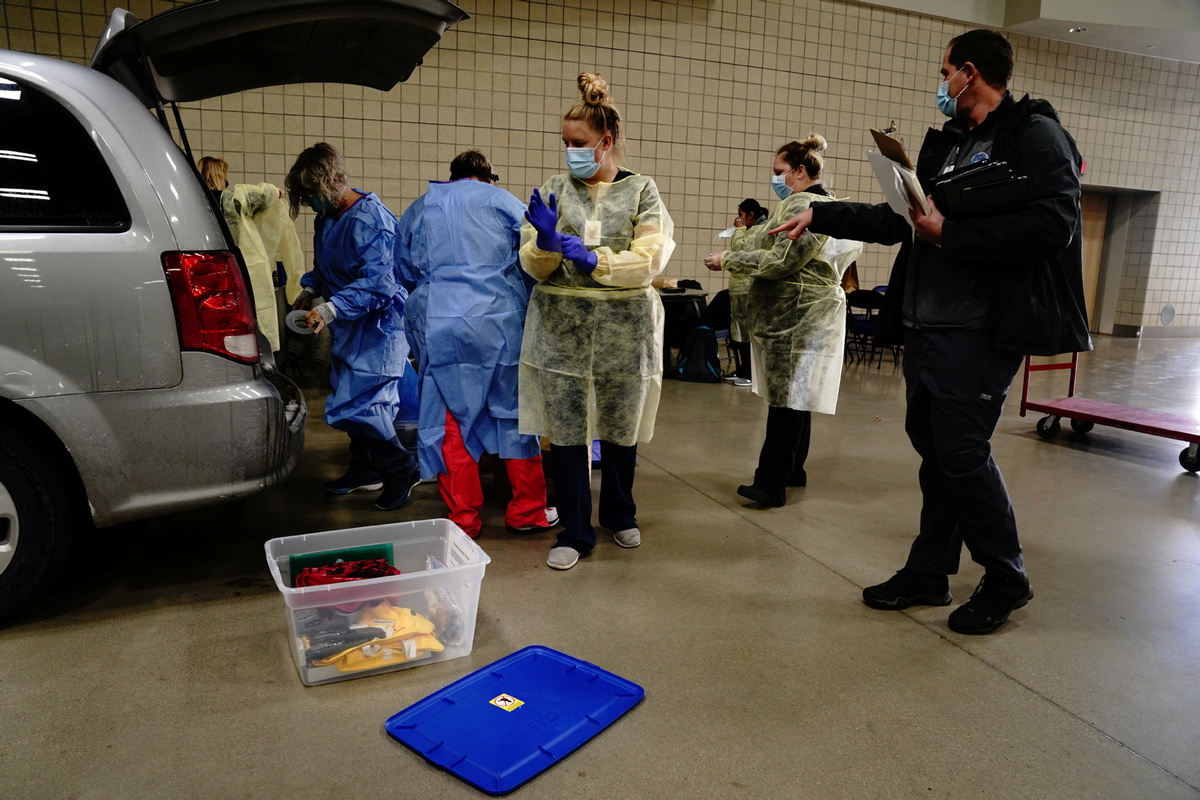US still facing shortage of PPE for virus fight


At the beginning of the COVID-19 pandemic in the United States in March, the country was scrambling to find personal protective equipment (PPE) for healthcare professionals to fight the deadly virus.
Now, that pressure is renewed after a report showing the US recorded 144,133 new cases Thursday, breaking the record for a second straight day, according to Johns Hopkins University. Hospitalizations also have soared, with at least 16 states breaking records. California on Thursday became the second state after Texas to report its millionth case.
Although the supply of PPE has improved since the spring, the US now finds itself still facing a shortage of gowns, gloves, masks and goggles as most states are dealing with another surge of coronavirus cases.
Recent reports from hospitals and nursing homes reveal that America's PPE stockpile remains woefully undersupplied and the US PPE supply chain underdeveloped.
Makers of N95 masks — which filter out at least 95 percent of very small particles, including viruses and are regarded as the most effective tool for protection against airborne droplets — are struggling to keep up with demand from hospitals, nursing homes and other healthcare facilities, as well as businesses in other sectors that require them to protect workers and the public, CBS News reported Tuesday.
3M Co, the largest domestic manufacturer of N95 masks, told CBS that "US and global demand for PPE continues to far exceed supply for the entire industry".
In Michigan, 2 out of 3 health systems reported less than a three-week supply for one or more category of PPE, with some hospitals reporting less than seven-day supplies of N95 masks, according to The Wall Street Journal. The state's health department recommends a 90-day supply.
In New Mexico, nearly 90 percent of hospitals are reusing N95 masks under emergency guidelines, as new cases have increased considerably recently. Wyoming's health officials also indicated the possibility of reusing N95 masks if hospitalizations rise further.
The most critical medical supply shortage that has been reported in recent weeks is in disposable nitrile gloves, 99 percent of which are manufactured in China and Malaysia. Few nitrile glove manufacturers operate in the US and establishing more production here is a lengthy process.
According to data from China, the US has imported 37.7 billion masks between March and October, averaging more than 100 masks per person in the US. In addition, the US also imported 140 million pairs of gloves, 560 million protection gowns and 41 million goggles.
Many nursing homes also are short of PPE, posing serious risk to vulnerable senior citizens, according to a recent study by the US Public Interest Research Group (PIRG).
The PIRG said that about 1.3 million people with long-term medical issues or short-term rehabilitation needs are residing in the nation's 15,000 nursing homes. The study found that 20 percent of nursing homes in late August had a less-than-one-week supply of one or more types of PPE.
The study also revealed that 20 percent of nursing homes reported that they were out of one or more types of PPE at some point from late May through late August.
A recent analysis of the PPE situation by Harvard Business Review concluded that a slew of glaring supply-chain deficiencies has yet to be fixed to solve PPE shortages.
The analysis found that the Strategic National Stockpile (SNS), established by President George W. Bush in 2004, was ill prepared to deal with the pandemic need for PPE because of lack of expertise.
"The SNS's hard-working employees are doing their best in the crisis, but we found key gaps in expertise. We believe that the SNS's slow response and lack of effectiveness in the crisis is partly due to a shortage of people who are capable of understanding the current state of play in the supply chain, making decisions, getting rapid authorization, and taking immediate action," the review said.
Mike Schiller, senior director of supply chains for the Association for Health Care Resource and Materials Management, said that a much more coordinated and strategic effort at the regional, state and national level is needed to deal with PPE shortages during the pandemic.
Schiller said that "5,500 hospitals building their own individual surge inventories is impractical and places an increased and unnecessary demand on the already fragile health care supply chain".
Democrat Joe Biden, who is moving forward with a presidential transition plan, on Monday named a 13-member group of healthcare experts to draft policies to address the coronavirus pandemic. He implored Americans to wear masks.
His plan includes setting up a national supply chain commander and a pandemic response board.

































